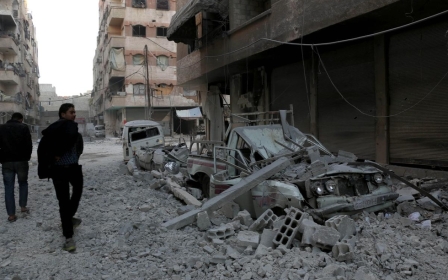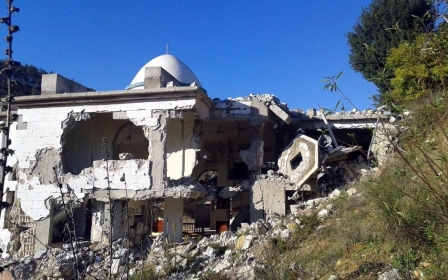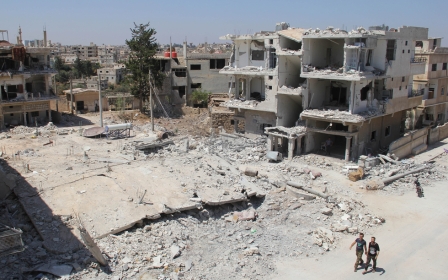Syria may not be Panem, but it’s full of 'Mockingjays'

I have previously ignored the advice of many film enthusiasts who have continuously recommended that I watch The Hunger Games franchise based on the best-selling book. However, I recently caved in to the repetitive statement, “you don’t know what you’re missing,” that I often received for not watching the films. Indeed, after watching the first Hunger Games, I finally realised what I was missing out on. I was officially won over – hook, line and sinker.
On the surface, Hunger Games follows the typical Hollywood archetypal narrative of good verses evil, with a heavy dose of non-stop action brought to life by an A-list cast. However, underneath the glamour of a Hollywood blockbuster lies a far deeper underlying message, one that shares a political narrative in line with the US government.
President Snow’s Panem and Assad’s Syria
The Hunger Games takes place in a dystopian future, in the fictional “Capitol” of the state of Panem, within the ruins of North America. The ruler of the state maintains a suffocating grip on 12 poverty stricken districts (regions of the state), by forcing each to select a boy and a girl, called “tributes”, to compete in an annual televised death match called the “Hunger Games” as punishment for a past rebellion. Every citizen must watch as their youth literally fight to death until only one remains. The films’ protagonist, Katniss Everdeen (Jennifer Lawrence), hails from District 12, the most deprived of the districts, who has very little to rely on besides her hunting skills, when she volunteers to replace her younger sister Prim (Willow Shields) for the 74th annual Hunger Games.
During the first film we see the manufactured love story of Katniss and her partner Peeta Mellark (Josh Hutcherson), which encapsulates the hearts of Panem’s ruling elite when they became victors of the 74th Hunger Games; but this is merely the beginning of what is to follow.
In the case of the totalitarian state of Panem, the obvious similarities to the Syrian war were screaming out at me. The oppressive regime of President Coriolanus Snow (Donald Sutherland) who controls the 12 districts with an iron fist has stark similarities to Assad’s Syria – both tyrants are infamous for violently quelling any form of opposition to their rule.
Grassroots uprising against a tyrant
The sequel, The Hunger Games: Catching Fire introduces the first indications of a grassroots uprising in Panem. The disgruntled inhabitants of the districts can no longer bear the socioeconomic deprivation that becomes the everlasting legacy of President Snow’s rule. The straw that breaks the camel’s back is when previous “victors” are forced to take part in the 75th annual Hunger Games – known as the ‘Quarter-Quell’ – when they were promised immunity from taking part in any future Hunger Games as a reward for their initial victory.
This blatant display of unadulterated dishonesty on the part of President Snow leads to the first wave of peaceful protests in the districts, symbolised by the "humming bird" tune and the show of three fingers – similar to the anti-regime chants and show of the single index finger (symbolising the oneness of God) or the two fingers of "peace" in Daraa in 2011, where the Syrian revolution began. Expectedly, President Snow responds in the same manner as Assad in the face of his people demanding justice – with sheer brutality.
So what began as non-violent anti-regime protests in most of the districts of Panem (except those closer to the Capitol that were favoured by President Snow) inevitably becomes violent as the situation develops into a battle for human survival.
Catching Fire ends with Katniss destroying the entire Hunger Games "system" with the unknown assistance of the "game maker" – Plutarch Heavensbee (Phillip Seymour Hoffman) – who facilitates the internal breakdown of the system in the first major achievement of the uprising against President Snow.
The leader of the rebellion, President Alma Coin (Julianne Moore), briefly appears towards the end of Catching Fire. She invites Katniss to lead the uprising, and makes no secret that she wants the heroine to unite all the districts, and be the inspirational PR face of the rebellion.
Propaganda and politicking
The third and final novel in the series is broken into two films, the first, The Hunger Games: Mockingjay - Part 1 ("Mockingjay" is a fictional bird in Hunger Games and the title given to Katniss) cements the notion that the series intentionally or unintentionally fictionalised major aspects of the Syrian war.
The disunity between the districts and its rebel factions, the war of attrition which had long surpassed that of a grassroots revolution, which assumed it would organically overthrow President Snow or that he would be pressured into "stepping down", bare all the hallmarks of the situation in Syria by 2013.
Unlike Syria however, there is no wider "cold war" between external players interfering in the affairs of Panem for geopolitical benefits. However, the power of wartime media and the importance of disseminating propaganda is the main focus of Mockingjay - Part 1. A game of sophisticated politicking between both camps to influence the psyche of Panem’s masses could not have been more similar to the war of attrition between the Assad regime and the Syrian rebels.
The strong emphasis on wartime propaganda embodied in Katniss as the poster-girl for Coin’s rebellion against the state-owned media of President Snow, reminded me how the Syrian conflict quickly became a media war consisting of sectarian rhetoric, distorted facts and misleading depictions of battle victories.
Post-Snow Panem and the future of Syria
I can only hope that the Syrian conflict might end like The Hunger Games: Mockingjay - Part 2 – the downfall of the Snow regime and the liberation of Panem under a unified rebel force. Unfortunately, Syria is not a movie, and the hope of a happy ending is far from a reality. With more than a quarter of a million people dead, nearly half the country’s population displaced, and now Western and Russian bombs pounding rebels under the banner of allegedly fighting ISIS, "liberation" appears to be a distant romanticised ending to what many Muslims regarded as the "blessed revolution" of the Arab Spring.
The truth is, Syria always had its “Mockingjays” – brave men, women and children who took to the streets of Daraa, Homs and Aleppo to voice their opposition to a despotic regime. Syria has thousands of Katniss Everdeens - farmers, shopkeepers, teachers, and former soldiers who took up arms to protect the unarmed masses. Sadly, many of Syria’s Mockingjays later became the pawns of regional and global powers, who continue to use them in their geopolitical cold war. Frustratingly, many of Syria’s Katniss Everdeens have joined rebel groups that are too busy fighting each other, or have been classified as "Islamists" - thereby not eligible to rule a post-Assad Syria, and qualifying to be bombed by the US-led coalition or Russia instead.
Will Syria’s Mockingjays be victorious over Assad? That appeared to be the case back in February 2013 when the rebels were knocking on the gates of Damascus. But now, the Syrian rebels are fighting battles on so many fronts that at times, the odds seem to be stacked against them.
However, what can be said for a fact is that the hunger games of starvation, death and destruction is real, and it continues to plague Syria with no imminent end in sight.
- Dilly Hussain is the deputy editor of British Muslim news site 5Pillars. He also writes for the Huffington Post, Al Jazeera English, and contributes to the Foreign Policy Journal and Ceasefire Magazine. He regularly appears on Islam Channel, Russia Today, and BBC TV and radio discussing Middle East and North African politics, British foreign policy, Islamophobia and the war on terror. Follow him on Twitter @dillyhussain88
The views expressed in this article belong to the author and do not necessarily reflect the editorial policy of Middle East Eye.
Photo: Actress Jennifer Lawrence attends the premiere of "The Hunger Games: Mockingjay - Part 2" at the AMC Loews Lincoln Square 13 in New York, on 18 November, 2015 (AFP).
New MEE newsletter: Jerusalem Dispatch
Sign up to get the latest insights and analysis on Israel-Palestine, alongside Turkey Unpacked and other MEE newsletters
Middle East Eye delivers independent and unrivalled coverage and analysis of the Middle East, North Africa and beyond. To learn more about republishing this content and the associated fees, please fill out this form. More about MEE can be found here.





